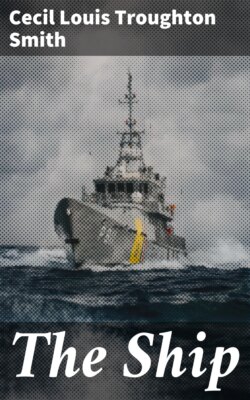Читать книгу The Ship - Cecil Louis Troughton Smith - Страница 5
На сайте Литреса книга снята с продажи.
ОглавлениеChapter II
Table of Contents
From the Captain’s Report:
Table of Contents
At 12:05 hours smoke was sighted ...
ORDINARY Seaman Harold Quimsby sucked a hollow tooth in which a shred of corned beef had stuck apparently inextricably. He ought to have reported that hollow tooth at least a month ago, but Quimsby was of the type of man who crosses no bridges until he comes to them. He did not let anything worry him very much, for he was of a philosophical nature, filled with the steady fatalism to be expected of a veteran of so much service, even though Quimsby was merely an “enlistment for hostilities only.” Some men would be uncomfortable up here in the crow’s nest—not so Quimsby, whose ideal existence was one something like this, with a full belly and nothing particular to do. As H.M.S. Artemis rolled and corkscrewed over the quartering sea, the crow’s nest swung round and round in prodigious circles against the sky, but Quimsby’s seasoned stomach positively enjoyed the motion and untroubled went on with the process of digestion.
Cold meat and pickles—that made a meal fit for a king. Quimsby liked nothing better than that. His portion of pickles had included no fewer than four onions, and Quimsby breathed out reminiscently, conscious of, and delighting in, his flavored breath. He had swallowed down his soup and his cocoa, but they were only slop, unworthy of the name of food. Cold meat and pickles were the food for a man. He sucked at his tooth again, and breathed out again, sublimely contented with the world.
Everything seemed to be designed for his comfort. The chair in which he sat certainly was—the padded seat and back held him in exactly the right position for keeping the horizon under continuous observation through the binoculars laid upon the direction finder before his eyes. As Quimsby rolled and circled round in the crow’s nest he automatically kept the horizon swept by the binoculars; long practice had accustomed him to do so. A thrust of his feet one way or the other kept his stool rotating from port to starboard and back again, while his right hand on the lever kept the elevation in constant adjustment to correspond with the roll of the ship. Thanks to many hours of practice Quimsby was able to watch the whole horizon forward of the beam without allowing any of his automatic movements to break into his internal chain of thought, from the shred of beef in his tooth to the comfortable state of his insides and from that to unholy memories of that little bint at Alex who had made his last shore leave so lively.
And from there his memories went back to his first arrival at Alex, his first glimpse of the East, and from there to his first voyage to sea back in the almost unbelievably distant days of 1939. He had been up in the crow’s nest then too, he remembered, and his forehead wrinkled in faint bewilderment at the certainty that the scared, seasick, self-conscious youth at the direction finder in those days was, unbelievably but beyond all doubt, the same man who sat there so self-assured and competent now. That first report he had to make, when his binoculars picked up the dot on the distant surface and he had rung down to the bridge, his stomach heaving with excitement and seasickness ...
“Something over on the left!” he had spluttered, all his previous instruction forgotten.
The unhurried voice of the First Lieutenant had steadied him.
“Where are you speaking from?”
“Headmast—I mean masthead, sir.”
“Then that’s what you say first, so that we know down here. And you don’t say ‘over on the left,’ do you? What do you say?”
“On—on the port bow, sir.”
“That’s right. But it’s better to give a bearing. What does your bearing indicator read?”
“Twenty-one, sir.”
“And how do you say it?”
“I—I’ve forgotten, sir.”
“Port is red, and starboard is green,” said the First Lieutenant patiently. “Remember that port wine is red, and then you won’t forget. And twenty-one isn’t plain enough, is it?”
“No, sir—yes, sir.”
“Now let’s have your report. Remember to say where you’re speaking from first.”
“M-masthead, sir. Object in sight. Red two-one.”
“Very good, Quimsby. But you must say it twice over. You remember being told that? If the guns are firing we might not hear you the first time.”
“Yes, sir. I mean aye aye, sir.”
He had been a very green hand at that time, decided Quimsby. He felt self-conscious all over again at the thought of how Number One had coaxed him into making his report in the proper form so that it could be instantly understood. The subject was almost unsavoury to him, and his thoughts began to drift farther back still, to the time when he was selling newspapers in Holborn—the evening rush, the coppers thrust into the one hand as with the other he whipped the copies out from under his arm.
Then he looked more attentively at the horizon, blinked, and looked again with his hand on the buzzer of the voice tube. Then he rang.
“Forebridge,” came the reply up the voice tube.
“Masthead. Smoke on the starboard bow. Green one-nine. Masthead. Smoke on the starboard bow. Green one-nine,” said Quimsby; ungratefully, all memory of that early training passed from his mind as he said the words.
